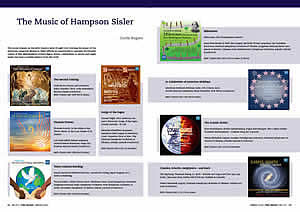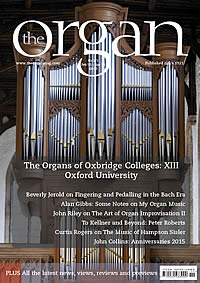February 2015 (Number 371)
Issue 371 includes features on:- Organs of University church of St. Mary the Virgin, the Sheldonian Theatre and the Holywell Music Room - Oxbridge Organs – XIII
- Fingering and Pedalling in the Bach Era
- The Art of Organ Improvisation - Part II
- To Kellner and beyond
- The Music of Hampson Sisler
- A New Life - rescue and rebuilding an organ destined for scrap
- Composers Anniversaries 2015
A well as features, there is news from the UK and abroad, plus reviews of choral and organ CDs, books, concerts, new organ music, new installations, letters, and more. To subscribe, or receive a complimentary copy if you're new to The Organ, visit our subscriptions page.
An excerpt from this issue (you can download the whole Hampson Sisler article here in pdf format: Hampson Sisler article)
The Music of Hampson Sisler

Curtis Rogers
The recent release on the MSR Classics label of eight CDs covering the music of the American composer Hampson Sisler affords an opportunity to examine the broader output of this distinguished creative figure whose contribution to sacred and organ music has been a notable feature of his life-work.
The works of Hampson Sisler (b.1932) recorded on the CDs under review here raise the interesting question as to how far music can bear a meaning which points beyond itself.
In some of these works the music serves a religious or philosophical purpose, or is clearly meant to put the listener in mind of spiritual matters, such as Four Anthems for a capella chorus (whose choral writing shows the hand of a well-practised organist and choir master, as Sisler has been for many decades), the Cantata for Living (1974), the Songs of the Sages (1998), The Cosmic Divide (2000) or the hour-long oratorio The Second Coming (2012-13). However the latter two compositions (using texts from the Book of Revelation) also seem to have an ostensibly political purpose, as the composer's own notes on the oratorio reflect that 'with rising hostilities, both international and on individual, intimate levels, many Christians believe that we are heading for a major crisis in worldwide evolution'.
Actual or impending disasters are something which preoccupy Sisler a great deal, and a number of the works here address these specifically; with composer's express intention that they serve 'as an encouragement to "warring" religions...to learn greater tolerance and acceptance' in the case of Faiths Cohabiting (2012); or further examples are Japan Tragedy (2011) dramatising the earthquake and subsequent tsunami of that year; Tsunami (2006) seemingly not referring to any specific event, but the tsunami which overwhelmed the Far East in 2001 must surely have been an influence; Thermals Rising (2008) concerns global warming; and Nature's Terrorists (2006) expresses the savagery from lower forms within nature such as piranhas and venus fly traps.
The text of Canatata for Living might be a rather anodyne series of platitudes ('Help us, Amighty God, to comply willingly and work your vineyard with understanding' or 'God, make us attentive parents, kinfolk, friends, in the broader family of humankind') but there is frequently the implication - explicit or latent - in works like that one, Faiths Cohabiting, and the others already mentioned, that they are not mere musical memorials, but exhortations (moral, ideological, social or so on) to mankind to take ction, and that Sisler is therefore making a political point.
Whether it was meant to or not, the Israeli-American Festival Overture (2013) - written to 'assist in the celebration of America's Independence Day in Israel. A symbol of Israel's gratitude for American support, both financial and political' - can surely only act as a provocation to critics everywhere of Israel and its problematic relationship with the US.
To see the whole article, please subscribe to The Organ.
For previous editions of The Organ, see our index of back issues.

